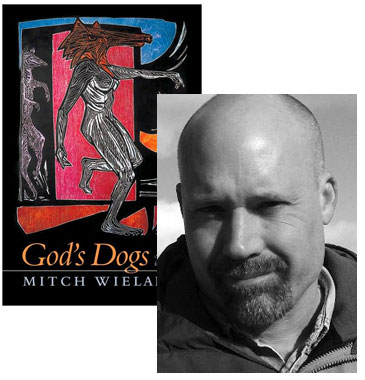Mitch Wieland Honors “Tandolfo the Great”

How sharp is SMU Press editor Kathryn Lang’s eye for fiction? Here’s a hint: I’ve been reliably informed that two of this year’s nominees for the Binghamton University John Gardner Fiction Award come from this university press. You’ve already encountered Tracy Winn, the author of Mrs. Somebody Somebody, through our current series of guest essays; now here’s Mitch Wieland, the author of God’s Dogs, a “novel in stories” about a man who put his past behind him to move out west only to have it (in the form of his ex-wife and her son) catch up to him and settle into the cabin. Well, maybe “settle” isn’t the right word… Anyway, I got hooked into Ferrell’s story early; as Fiction Writer Review notes, “In an age of books built from blogs, tweets, and text messages, Mitch Wieland’s new novel-in-stories feels as though it were made of wood.” Here, Wieland pays tribute to another story with a raw and natural power.
When I need a swift dose of beauty and wisdom, I read the stories of Richard Bausch. Bausch’s lyrical prose and fierce intelligence, his abundant compassion and generosity, never fail to restore me. To my mind, Bausch is truly our modern Chekhov. Like that grand Russian godfather of the short story, Bausch’s work offers luminous insight into our meager race.
“Tandolfo the Great” is classic Bausch. Here we have his graceful language, both spare and lovely at the same time. Here we have Bausch’s fantastic characterization, where we not only witness his people from the outside, the limited external view, but we experiencetheir rich inner world, gain privy to the private workings of their hearts and minds. This compelling psychological component is Bausch’s forte. If fiction is indeed about human yearning, as many of us propose, then look no further for a master’s exquisite rendering of our complicated needs and desires. As the story’s scenes unfold, we continually access Tandolfo’s emotions and feelings—always nuanced to the dramatic moment—and we know deeply his thoughts as he responds to the world.
In “Tandolfo the Great,” our hero is a twenty-six-year-old loner named Rodney Wilbury. As a side job, Rodney moonlights as a clown (“the Great Tandolfo”) who performs magic acts at social gatherings. Our story opens with Tandolfo, already slightly tipsy in the afternoon, as he finishes his clown makeup before his bathroom mirror:
“She loves you not, oh, she doesn’t, doesn’t, doesn’t.”
We soon learn Tandolfo is having a very bad day. He had planned to propose to a co-worker from the department store where they both work. For this special occasion, he has purchased an enormous six-tiered pink wedding cake, which now looms in the back seat of his car. As his perpetual poor luck would have it, the woman has just left a note on Tandolfo’s front door—she is returning to her former boyfriend, who has asked her to marry him at last. She wants to celebrate the exciting news with Tandolfo and give him a big hug.
Despite his broken heart, Tandolfo has a scheduled appearance at a birthday party for a five-year-old boy. We follow our hero as he drives across town in full clown makeup, nipping at a flask of bourbon in the car. When Tandolfo performs his magic tricks at the party, things do not go well, as we have feared. The moment is rendered with a heart wrenching blend of humor and melancholy. In the disastrous aftermath of the party, Tandolfo returns to his car, pummeled and torn, yet saintly in his sad clown glory.
I won’t fully give away the finely wrought ending, other than to say it involves the cake and the street where Tandolfo’s lost love lives. Bausch finishes the story with our hero waiting for what will come next. We acutely share this concluding scene with Tandolfo, feel his tangled emotions, his joy and pain, because these feelings are our own.
“Tandolfo the Great” is one of dozens of terrific stories in The Stories of Richard Bausch, winner of the Pen/Malamud Award. Read these stories. You too will be restored.
(On a concluding note: The seed of “Tandolfo the Great” came from Bausch’s longtime buddy, the legendary George Garrett. On NPR radio, Garrett was asked to offer up an image for his writer friends to include in a story of their own. He chose a “wedding cake in the middle of a road.” Over a decade later, at a tribute to George Garrett in Knoxville a few years before his death, the writer Allen Wier placed a cake in the middle of a residential street as Garrett arrived for a reception in his honor. With Bausch and I watching from the sidewalk, Garrett put the car in park, got out, and laughed and laughed and laughed.)
25 May 2010 | selling shorts |

 Our Endless and Proper Work is my new book with Belt Publishing about starting (and sticking to) a productive writing practice.
Our Endless and Proper Work is my new book with Belt Publishing about starting (and sticking to) a productive writing practice. 
